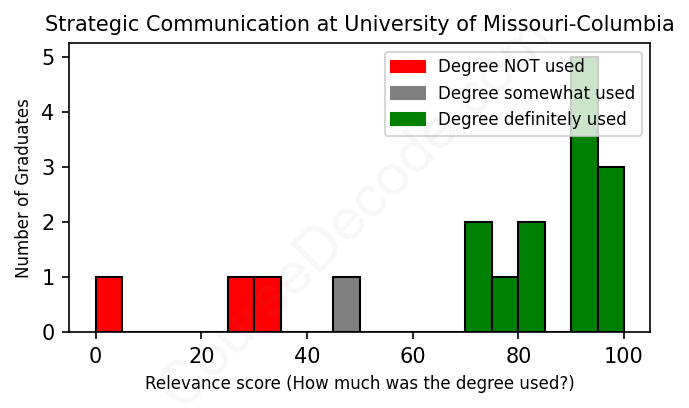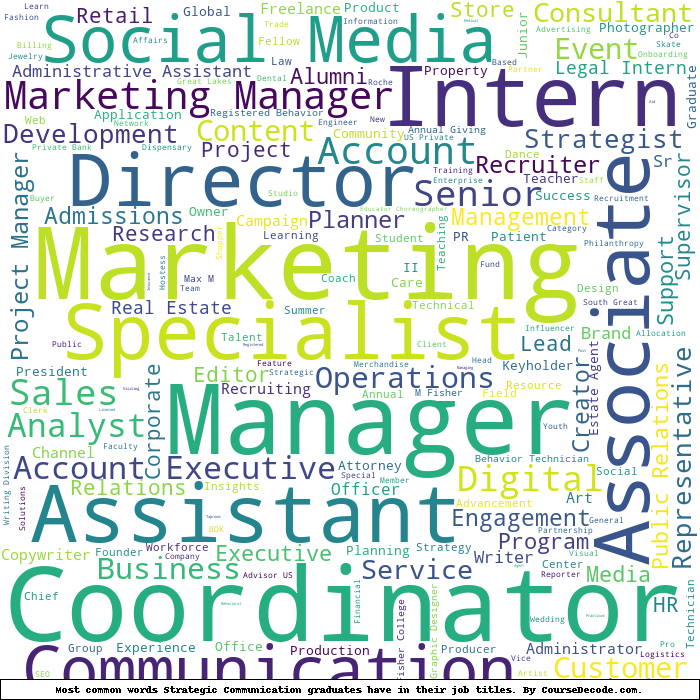
First, some facts. Of the Strategic Communication graduates from University of Missouri-Columbia we've analyzed , here's how many have used (or NOT used) their degree in their career:

These are estimates based on AI analysis of 17 LinkedIn profiles (see below).
The verdict? Above average. Overall, with an average relevance score of 73%, Strategic Communication graduates from University of Missouri-Columbia have a higher likelihood (+6%) of finding work in this field compared to the average graduate across all fields:
And for comparison, here's the chart for all profiles we've looked at across all degrees.
Also, after graduating, 41% of these graduates have pursued further education other than another Bachelor's degree (such as a Masters degree or other), compared to the average across all profiles of 35%. This suggests you may need more than just a Bachelors degree to be competitive as a Strategic Communication graduate.
See the details:
|
Relevance score: 95% We think this person has gone into a career highly relevant to their degree. We think this person has gone into a career highly relevant to their degree.
DEGREE INFOGraduated in 2021 from University of Missouri-Columbia with a Bachelor of Journalism in Strategic Communication. No other secondary education since. JOB HISTORY SINCE GRADUATIONPublic Relations Specialist and Content Manager AdZou Jan 2021 - May 2021 Marketing Intern  Pulse ISM Medical Marketing & Inside Sales Apr 2021 - Aug 2021 Account Coordinator  Franchise Elevator PR Sep 2021 - Sep 2022 Account Executive  Franchise Elevator PR Sep 2022 - Dec 2022 Public Relations Coordinator  ALDI USA Jan 2023 - Present ABOUTGraduate from the University of Missouri with a Bachelor's Degree in Journalism with an emphasis in Strategic Communication and a Minor in Business Administration. Currently a Public Relations Coordinator at ALDI USA. |
The top 10 most common jobs done by the graduates we've analyzed (ranked most common to least) are:
When looking at the career paths of graduates from the University of Missouri-Columbia with a degree in Strategic Communication, it’s clear that many have gravitated toward roles in public relations, marketing, and communications. Positions like Account Executive, Marketing Coordinator, and Public Relations Specialist pop up frequently, indicating that the degree prepares students well for these areas. A big chunk of these jobs directly relates to the core skills taught in the program, such as crafting effective messages, understanding audience engagement, and implementing strategic communication plans. For instance, many have secured roles where they can utilize their skills in writing, media relations, and brand strategy, showing that these positions are a natural fit for what they learned during their studies.
However, not every position these graduates have landed is directly relevant to strategic communication. Some have ventured into fields like digital marketing and even roles in completely different industries, like software engineering or project management, which don’t leverage their communication training as effectively. While these jobs may still demand general communication skills, they often veer away from the more specialized knowledge and strategies focused on in the Strategic Communication degree. Overall, while many graduates have indeed landed relevant jobs that align well with their education, it’s a mixed bag when it comes to the direct application of what they learned in college. Some of them are definitely more spot-on than others.
Here is a visual representation of the most common words in job titles for Strategic Communication graduates (this is across all Strategic Communication graduates we've analyzed, not just those who went to University of Missouri-Columbia):

Graduates from the University of Missouri-Columbia who studied Strategic Communication seem to have diverse career paths, often beginning with internships or entry-level positions in marketing, communications, and public relations. It's common to see them start off as interns or coordinators, gaining hands-on experience in various organizations. For instance, many who graduated in the early 2010s held positions like communications intern, account coordinator, or marketing specialist right after graduation. This kind of starting point is pretty typical in the field, where building a portfolio and gaining relevant experience is crucial.
As time goes on—five to ten years post-graduation—the trajectory tends to shift towards more senior roles and specialized positions. A lot of these graduates move up to account manager, digital strategist, or even director of communications roles. Some have landed impressive positions such as Senior Manager or Director-level roles in established firms. While it’s clear that a significant number have enjoyed successful careers closely tied to strategic communication, it's also worth noting that some have ventured into different fields or taken roles that may not align as closely with their major, like software engineering or unrelated marketing roles. Overall, though, many of these grads appear to be on positive career paths that leverage their strategic communication skills effectively.
Hey there! So, if you’re looking at a Bachelor’s degree in Strategic Communication at the University of Missouri-Columbia, I'd say it's pretty manageable but definitely has its challenging moments. It’s not as tough as some of the super technical degrees like engineering or hard sciences, but you will need to put in a decent amount of effort. There’s a mix of creative and analytical work—think writing, research, and presentations—so if you enjoy those things, you'll probably find it engaging. As with any college program, there will be times when things get intense, especially during projects or exams, but with good time management and motivation, most students find they can handle it just fine. Overall, it strikes a balance between being interesting and challenging without being overwhelmingly hard!
Most commonly, in the LinkedIn profiles we've looked at, it takes people 4 years to finish a Bachelor degree in Strategic Communication.
Looking at these graduates from the University of Missouri-Columbia, it seems like a mixed bag when it comes to income potential. The earlier grads, especially those who transitioned into more stable roles like the software engineering position or legal fields, likely found themselves on a solid pay scale, especially as they gained experience. On the other hand, some of the more recent graduates are still working their way up through entry-level roles and internships, which usually indicate lower salaries. Overall, those in strategic communications roles have potential for decent earnings, especially if they climb the ladder in their companies, but it might take a few years for some to really hit their stride financially. So, while a good number are likely doing well, others are still building their experience and income.
Here is a visual representation of the most common words seen in the "about" section of LinkedIn profiles who have a Bachelor degree in Strategic Communication (this is across all Strategic Communication graduates we've analyzed, not just those who went to University of Missouri-Columbia). This may or may not be useful:

Here are all colleges offering a Bachelor degree in Strategic Communication (ordered by the average relevance score of their Strategic Communication graduates, best to worst) where we have analyzed at least 10 of their graduates:
| College | Score | Count |
|---|---|---|
 University of Missouri-Columbia University of Missouri-Columbia
|
73 | 17 |
 Texas Christian University Texas Christian University
|
67 | 12 |
 University of Utah University of Utah
|
54 | 10 |
 The Ohio State University The Ohio State University
|
47 | 21 |